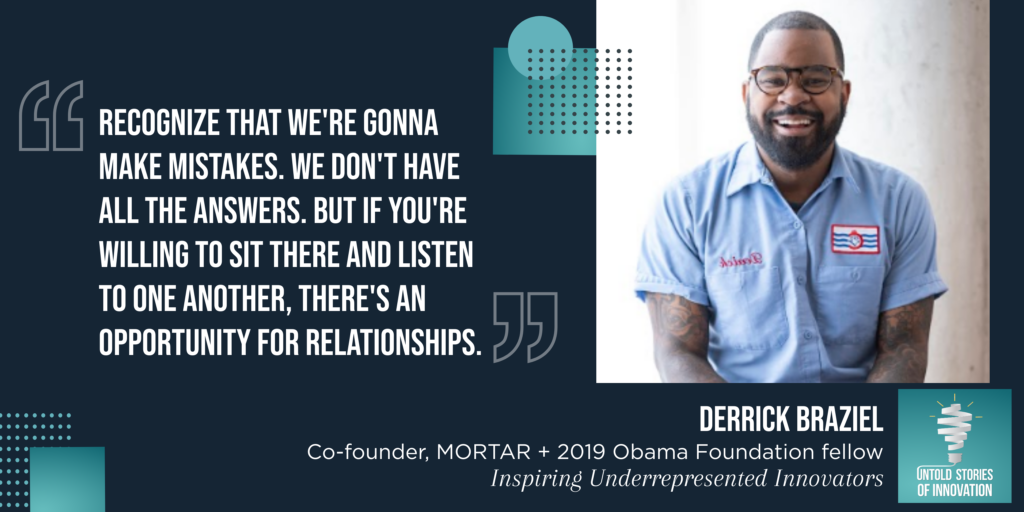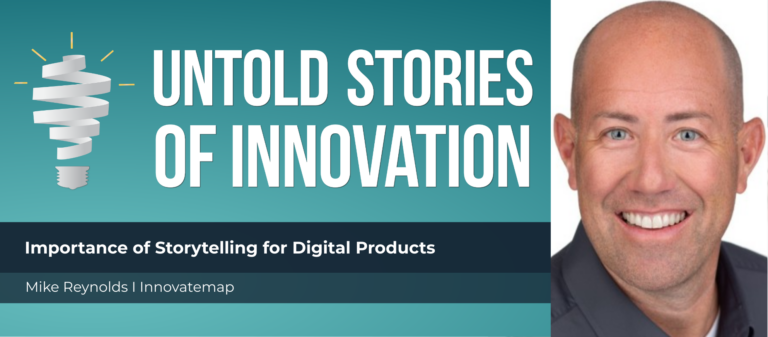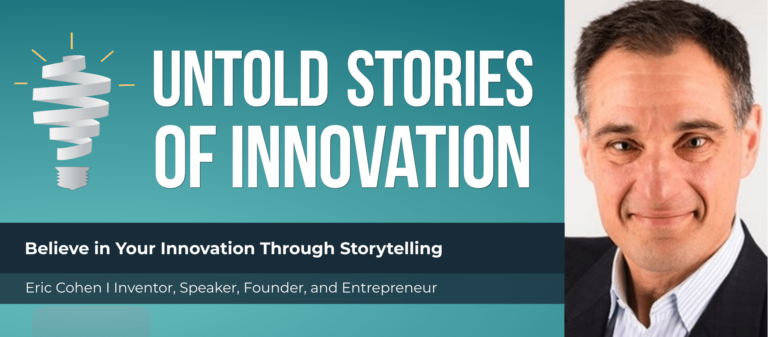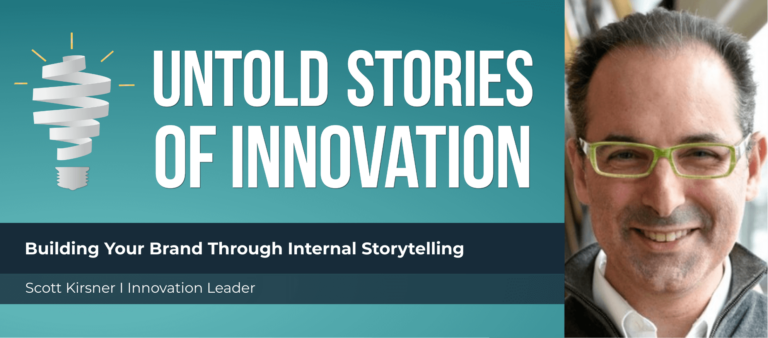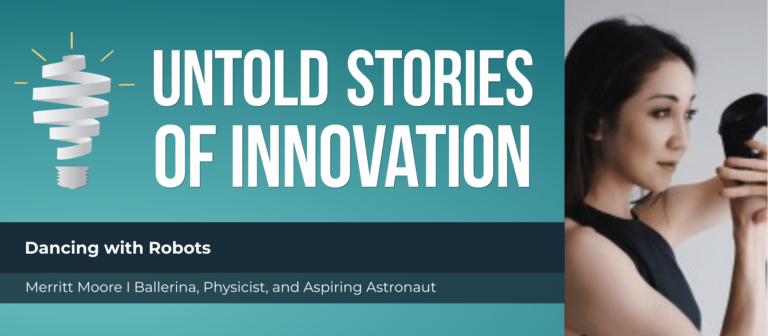Inspiring Innovation with Derrick Braziel
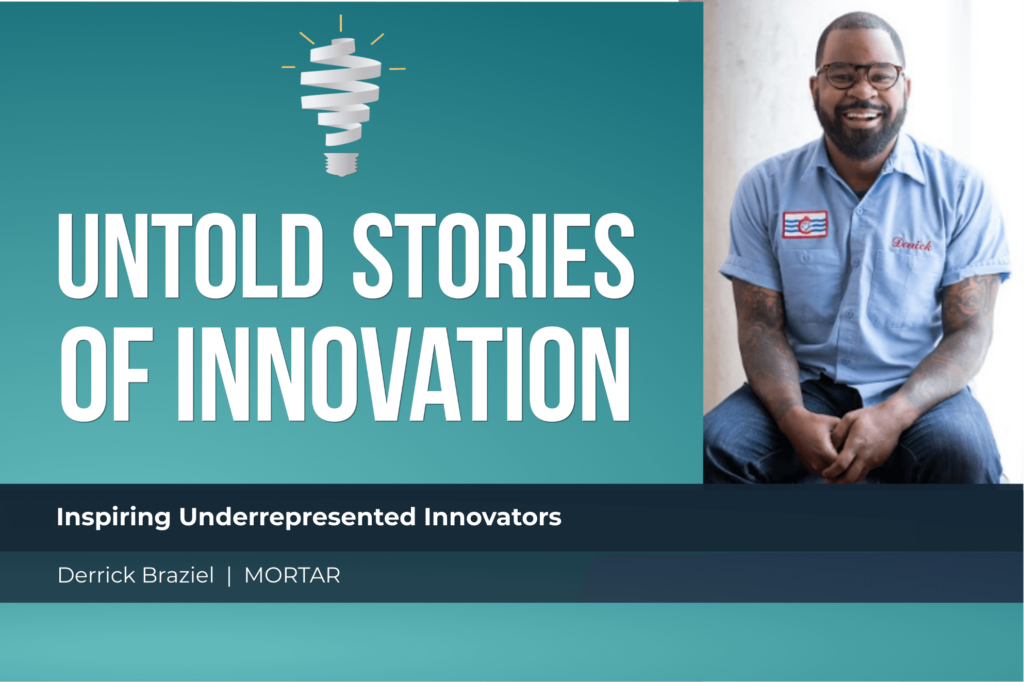
Inspiring Innovation - Untold Stories of Innovation
“It’s about a larger story, which is this renaissance that’s happening in Cincinnati. And I can’t think of a single person that I’ve ever met who lives in Cincinnati that doesn’t want the city to get better. And I think that most of us would agree that it’s a better city if all of us can participate.” —Derrick Braziel, co-founder of MORTAR Cincinnati & 2019 Obama Foundation fellow
Why do stories matter to the innovation process? What values can be instilled in innovators who share stories? How do innovation leaders inspire creators to tell and share their success and failure stories?
Derrick Braziel is a 2019 Obama Foundation fellow and a co-founder of MORTAR Cincinnati, an entrepreneurial hub supporting minority and underrepresented entrepreneurs. Derrick started MORTAR because he realized people in Cincinnati, and all around the nation, have great ideas but aren’t necessarily connected to the best tools and resources for starting businesses.
Their mission is to offer non-traditional entrepreneurs the opportunity to use their inherent talents to not just make a dollar, but to positively participate in the rise of Cincinnati. We discuss how collaboration, paired with skillful storytelling, can support this mission and bridge the resource gap. This gap exists between investors and entrepreneurs; students and quality education; and ultimately, between communities and what is considered valuable. MORTAR helps make Cincinnati a diverse, economically inclusive community that has ranked as a top growth center for innovation in the United States and one of the best places to be a minority entrepreneur. With world-class resources and a network of startups, BigCos, universities, and venture capitalists, Cincinnati’s growing innovation ecosystem is an inspiration to cities across the nation.
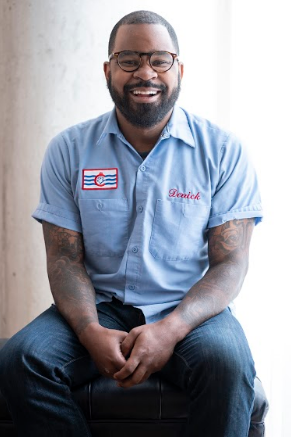
Derrick Braziel serves as a Founding Partner and Development Director of MORTAR, an organization dedicated to enabling historically marginalized entrepreneurs to start businesses, change communities and build generational wealth. Derrick’s work has led to recognition from the Indianapolis Star, YES! Magazine, Next City, Politico, the Stanford Social Innovation Review, Essence Magazine and NBC Nightly News. He has also been named to Forbes’ 30 under 30 list for Social Entrepreneurs.
He is an Echoing Green and 2016-17 BALLE (Business Alliance for Local Living Economies) Fellow, a 2018 Next City Vanguard and 2019 Obama Foundation Fellow.
This episode, Inspiring Innovation is powered by data storytelling training from Untold Content and Data+Science. Transform your data into powerful visual stories by learning best practices in data visualization and technical storytelling. Whether you’re a PowerBI or a Tableau person—or just want to better communicate your data—this workshop will inspire you to see the stories that lie in the data. Learn more at untoldcontent.com/data-storytelling-training.
Katie [00:00:00] Our guest today is Derrick Braziel. He is a co-founder of MORTAR Cincinnati, an entrepreneurial hub supporting minority and underrepresented entrepreneurs. Derek is also a 2019 Obama Foundation fellow, so I can’t wait to ask all kinds of questions about how you founded MORTAR and how it’s grown and changed over the last few years.
Derrick [00:00:20] Awesome. Can’t wait.
Katie [00:00:21] Thanks for being here.
Derrick [00:00:22] Thanks for having me.
Katie [00:00:23] So tell me a little bit about your personal story of innovation. What drove you to want to found this hub that has just been so transformational to Cincinnati and beyond at this point?
Derrick [00:00:36] Well, again, thank you for having me today. I’m really excited for this opportunity. You know, I moved to Cincinnati almost seven years ago now, and when I moved to Cincinnati, I lived in Over-the-Rhine and I still live in Over-the-Rhine. And I was immediately struck by all the amazing potential that that neighborhood has, all the new bars, all the new restaurants, all of the amazing buildings that are in that community. And that was the first thing that I noticed was so much potential and so much opportunity in that community. I also noticed that it is a neighborhood that’s in transition. A lot of the residents who made up the fabric of that community were starting to leave.
Katie [00:01:16] Yes.
Derrick [00:01:17] And I saw these new bars and restaurants and stores that were opening. And I have like those new establishments were representative of that community, and I felt like there was a disconnect that was there. In parallel, there was a Kroger that was in Over-the-Rhine. And every time I walked to this Kroger, somebody would ask me if I needed a ride, because that was their way of doing car sharing. All of us have Uber. All of us have Lyft. But I was thinking, what if those guys were given the same access and the same opportunity or the same resources to start the same kind of idea and concept that they’re asking people every single day if they wanna participate in. And we localized that to Over-the-Rhine. Those folks were not given the same opportunities and resources to participate in this revitalization that was happening around them. So my colleagues and I got together. We pitched this vague idea at an event called Fuel the Fire through Give Back Cincinnati. It was to create this entrepreneurial hub to support Over-the-Rhine residents. Somehow, we won two thousand dollars and that was where the idea for MORTAR was birthed. And that was where things got started. It started from a place of seeing hope, seeing opportunity and thinking we could do something about it. And that was now five years ago.
Katie [00:02:36] Incredible. You know, I think every city is grappling with their own issues of gentrification and cultural change and the challenges with diversity, inclusion, participation, making sure everyone has a seat at the table. Over-the-Rhine was such a—still is to some degree, but historically has been an incredibly diverse neighborhood. Appalachian residents, German immigrants, African American. It’s really this interesting space. And I know my family heritage, Appalachian and German. So I have some roots in Over-the-Rhine. And it’s incredible the applicability of what you’ve created to other cities. Have you found yourself? I’m jumping straight to your sort of global influence at this point. Have you found that other cities and other neighborhoods are starting to model or ask how you did it, how you transformed, you know, and how you sort of used this as a way to speak back against some of the critiques that come with gentrification?
Derrick [00:03:39] Definitely. I think two things have happened that MORTAR recognized very early on. One is that we teach entrepreneurship in the United States based upon one particular worldview: white, straight, male. And typically those people come from a position of privilege.
Katie [00:03:55] And they are the ones who get most of the venture capital still. Things are getting better, but it’s a slow process.
Derrick [00:04:01] Slow process. So the first thing to recognize is there are other ways to teach entrepreneurship. And we recognize that people of color, we have different learning styles and different cultural references and different cultural contexts. So we wanted to figure out a way that we can teach the nuances and the principles of entrepreneurship in a way that was digestible to folks that traditionally have not been incorporated into those traditional entrepreneurial systems. So that was the first thing that we recognized and we started to work on. The other thing that we recognized is that the folks, particularly in Over-the-Rhine, were people that were doing the very best that they could. They have a job, which is to revitalize this community and maybe they didn’t know how to reach out and engage diverse populations. Yeah, maybe they just weren’t aware. Or maybe they needed some help and support. And what we wanted to do was to build bridges. Yeah. We wanted to find these entrepreneurs and train them and to build their confidence in themselves while also working with those folks that were, at the time, decision makers, whether it’s developers or whoever it might be. And to provide a bridge for those folks to work together to find common goals and common objectives. And the hope is that when this would happen, you have a more diverse, economically inclusive community. And I believe we’re starting to see that in Over-the-Rhine. So with those building blocks, other communities are saying, well, how can we replicate that same experience? Many of us, I think, would know that Cincinnati has a very complicated history, especially around race, justice, inclusion.
Katie [00:05:35] Yeah.
Derrick [00:05:35] Yet last year, Cincinnati was ranked as one of the best places in the United States to be a minority entrepreneur. We’ve come a long way.
Katie [00:05:44] That’s incredible.
Derrick [00:05:44] So, if it can happen in a place like Cincinnati, why couldn’t it happen in a place like Milwaukee? Why couldn’t it happen in other cities that are grappling, like you said, with gentrification, with economic inequality, et cetera, et cetera? So we’ve been working on creating a framework that in theory you could incorporate in whatever community that you are located in. And we’re starting to test and experiment with that. So I mentioned Milwaukee.
Katie [00:06:07] Oh, I’m so excited about that. I didn’t know that when I asked the question, but that’s where my instincts were pulling. I’m really glad you’re doing that.
Derrick [00:06:14] We’ve been working in Milwaukee for the past two years, we’re going to be growing into two cities this year, two cities the year after that. And I think our long-term goal and objective is to change the face of entrepreneurship in this country. To see every person, regardless of their background, regardless of how they look, regardless of how they talk on their cultural norms. Anybody in this country with the right support systems can participate in this idea of the American dream. And that is what I think MORTAR is trying to do, to show that it’s possible to create a pathway for that to happen.
Katie [00:06:44] Share with us some of the innovation stories coming out of MORTAR and some of the startups that have stood out to you. Yeah.
Derrick [00:06:50] Sure. I should also say, before I answer that question, that we also need to redefine our definitions of success. I think for a lot of people, success is stepping out, applying for a program, going to an interview and seeing where the chips fall. If you’ve never seen anybody in your family even take that first step of having an idea and trying to actually work on it, I want to say and validate that that is success and we should honor that.
Katie [00:07:19] Yes.
Derrick [00:07:20] Taking that step and entrepreneurship, as you both know, is very, very difficult.
Katie [00:07:23] It is so scary.
Derrick [00:07:24] So scary.
Katie [00:07:25] [00:07:25]It’s the most vulnerable feeling in the world [1.5s] to have an idea that in your gut or in your mind or in your heart is right and good. And to be willing to say it out loud, it is incredible to me. Anyone who’s willing to speak up, I don’t care if you’re six years old or you know you’re a grandparent. It’s the fear of being judged, the fear of not being worthy. It’s always there in the back of all of our minds, no matter how much we’ve gotten external validation for how great our ideas are or not. I think it’s really tough. So I love that you started with what success looks like. That has to be part of it.
Derrick [00:08:05] And the reality also is that there is no safety net if there’s failure. So you are really risking so much.
Katie [00:08:11] Yeah.
Derrick [00:08:12] Just by taking this courageous step and trying to create a new future for yourself and your family. So I always honor a lot of the people who have just even applied for MORTAR’s program and say that that for me is success and we should honor that. Now, to answer your question. At this point, we have almost 300 graduates of our program. We’ve had 21 classes here in Cincinnati, several in Milwaukee. So we’ve had a lot of folks who have come through our program who I think are making history in Cincinnati. One person that comes to the top of my head is a guy named Brian Jackson. Brian Jackson was a graduate of our first class in 2014. He won our pitch night. And he has a passion for brewing. And he wanted to start a brewery. I think we both just instinctually would understand that opening a brewery would be very capital and time intensive. And he at the time was working with some local brewers in town and testing out his recipes and trying to figure things out. And he’d been working diligently to open a brewery one day. One day, myself and my colleagues were watching March Madness at a brewery. And one of our colleagues who worked for a developer in town asked us if we knew anybody who had a passion for brewing. And we said, yes, we know a guy. And we connected Brian with the developers. And fast forward, Esoteric brewing is open in 2020. The first black-owned Brewery and the history of Cincinnati.
Katie [00:09:32] Oh, my goodness.
Derrick [00:09:33] And we were able to be a part of that story. And now it’s making history.
Katie [00:09:36] Where is this going to be?
Derrick [00:09:38] It’s at people’s corner.
Katie [00:09:39] OK.
Derrick [00:09:39] In Walnut Hills on the corner of McMillan and Gilbert.
Katie [00:09:42] Yes.
Derrick [00:09:42] So that’s a really cool story.
Katie [00:09:45] Wonderful part of town. That’s incredible.
Derrick [00:09:46] Yeah.
Katie [00:09:46] Thank you for sharing.
Derrick [00:09:47] Yeah.
Katie [00:09:47] There’s sort of a gap in time there. Right. It’s taken five years or so for that dream to become realized.
Derrick [00:09:53] That’s right.
Katie [00:09:53] The patience and persistence of entrepreneurship. It always amazes me.
Derrick [00:09:58] It’s a long journey. It’s a very, very long journey. Another really quick story from our first class as well. Just to, again, give you the timeline of how much time it takes to have some of these ideas become a reality. There is a gentleman named Means Cameron. He started BlackOwned. It’s a very popular apparel line here in Cincinnati. He’s had some of the most successful athletes, entertainers wearing his clothing. But he wanted to create a space for people of color to come together, to be entertained, to fellowship—whatever it might be. And he needed access to capital to make that happen. He went to a lot of the traditional financial institutions in Cincinnati. You can imagine what they said. No. So he was feeling pretty desperate. But he came to MORTAR. And he said, can you guys support us in this? And we said, yes. And not just did we say yes. We then were able to leverage those resources to go to Main Street Ventures, which is an organization in town that provides access to capital. He then went to another organization in Cincinnati called Greater Cincinnati Microenterprise Initiative and got even more resources and Black Coffee opened in 2019. And that’s, for me, a really inspiring story because it talks about the power of collaboration, not just MORTAR. It’s all these organizations coming together to support an entrepreneur, because in my opinion, it really takes a village to support entrepreneurs. No one, in my opinion, can do it alone. So that gives me a lot of encouragement that our ecosystem is now beginning to rally around these entrepreneurs and supporting them. Final story is my own personal story. I love to go to Mexico. I’ve been there several times. I went to Mexico City.
Katie [00:11:40] Just for travel? To see the world?
Derrick [00:11:42] Initially it was, you know, just to travel. I loved being in Mexico.
Katie [00:11:45] Yeah.
Derrick [00:11:46] And I started to eat these tacos when I was there. Al pastor tacos. It’s a soft taco that came to Mexico in the 1940s from emigrants from the Middle East. It’s like a euro, but they replace the lamb with pork, but it’s roasted.
Katie [00:12:05] Is it a thicker bread?
Derrick [00:12:06] It’s not breaded at all.
Katie [00:12:07] Oh, it’s not. OK.
Derrick [00:12:09] Oh, sorry. You mean like the—it’s a corn tortilla.
Katie [00:12:09] OK.
Derrick [00:12:11] Corn tortilla. But there are some parts of Mexico that you use flour. They’re saying traditional to the Lebanese culture that introduced this style of tacos to central Mexico. But in Mexico City, they use corn tortillas. They have a special blend of chilies and spices. And I came back to Cincinnati now is like, man, I can’t find this taco anywhere.
Katie [00:12:31] Yeah.
Derrick [00:12:32] And in parallel—
Katie [00:12:33] I’m so hungry already right now listening to this.
Derrick [00:12:36] In parallel, you know, we’ve been working for the last several years helping entrepreneurs start businesses. So have all this knowledge about the dos and don’ts of entrepreneurship. So I thought maybe I could start my own business. So I came back last February. I bought a taco cart in March and I graduated from MORTAR’s program in December.
Katie [00:12:58] Wow.
Derrick [00:12:59] And that was our 21st class. So I am also a proud graduate of MORTAR. And I recognize that the resources that we offer can be so instrumental in helping entrepreneurs succeed that I myself as an entrepreneur felt the value in taking the class myself.
Katie [00:13:14] Have you named your taco company yet?
Derrick [00:13:16] Yeah, it’s called Pata Roja. It means red legs in Spanish.
Katie [00:13:20] And it’s a cart, right now?
Derrick [00:13:21] It’s a cart. But I do pop ups across the city. I get a pop up at a restaurant in Over-the-Rhine called 40 Thieves, OK? And I used their kitchen space. But outside of that, I’m typically on the street selling my tacos.
Katie [00:13:32] Oh, my gosh, that’s incredible.
Derrick [00:13:33] Yes.
Katie [00:13:33] And we have several sort of entrepreneurial kitchens as well in Cincinnati.
Derrick [00:13:36] I use one.
Katie [00:13:37] Yeah. I’m thinking of Findlay Kitchen.
Derrick [00:13:40] Yeah Findlay Kitchen. I use the Incubator Kitchen Collective in northern Kentucky. It’s a great resource. You know, I’m going to keep belaboring this point, but I’m so excited about where Cincinnati is in terms of our entrepreneur ecosystem. It feels like wherever you are in your entrepreneurial journey, whether you’re just in the beginning, whether you’re in food, whether you’re in tech, wherever you are, regardless of your background, race, et cetera, there are resources that are available to you. And not just any resources, world-class resources available to help you take your idea to the next level. So it’s really encouraging about where we are as a city in comparison to other cities.
Katie [00:14:14] I agree. And I think, too. Another thing that stands out and you’ve already demonstrated in our conversation the fact that community is so important to us and no matter whether we’re celebrating a win or recovering from a loss, we are constantly looking to thank and reengage with the resources that are out there. So, you know, even in your stories for those three that you shared, each one of them you mentioned it was this organization that supported it. It was this funder. It was this group who believed. And it’s unique. It’s really unique. And it’s also interesting how our enterprise organizations that are here, we have some really big companies in Cincinnati—long-standing companies and they’re playing in this space, too. There is an imperative. You know, they’re getting a lot out of not just mentoring startups but seeing the startups and the disruptors as mentoring them. And there’s more openness, I think, to those relationships and to piloting out their ideas than there’s ever been growing up. I grew up here, actually. And it’s—this was not so much part of our identity when I was younger in the city, but I’ve watched this transformation. And now it’s really sort of a beacon in the Midwest in particular.
Derrick [00:15:37] Why do you think that is?
Katie [00:15:38] You know, I think—what do I do? I first turn to community. I think some of the public private partnerships that have been created, Centrifuse being one of them, that’s super unique. The fact that we had government funding plus enterprise funding, pairing with venture capital funding, that’s really unique. I think organizations like MORTAR. For me, when I was starting Untold Content—it was about three years ago. So MORTAR was off the ground at that point. You had a physical location on Vine Street. And I was a professor at Miami University, Oxford at the time. And there was visibility in my city about entrepreneurship. And there was an identity forming and a rallying cry with Startup Cincy that I felt I could own as well. And it was ultimately what led me to kind of resign from what I thought was gonna be my perfect dream job as a professor. And I said, I have to be part of this. This is where it’s happening. And my life will be very interesting and surprising if I follow this path. I mean, so that for me, I think those elements and sort of hearing how you had a chance to share your idea, I’d never heard that’s how MORTAR was founded. But I came in a little bit later into the scene. And yeah, I think for all of those reasons, our city has been pretty incredible. The amount of funding, too, coming and not just local angel investors, but some of the funds running here in town are actually funded by collaborations from the West and East coasts. And so there’s a lot of play here, a lot of VC’s are flying in—a lot—to hear ideas. And now they’re on boards of different startups. And so they come back more frequently and keep their finger on the pulse of what’s happening. What do you think? Do you agree?
Derrick [00:17:29] I agree. But the question that is still in the back of my head that I wanted to ask you, you talked about these larger, long-standing institutions. I’m thinking of, like, Procter & Gamble, the largest branding company on the planet. What incentive do they have to reinvest in Cincinnati? What incentive do they have to work with local entrepreneurs, and StartUp Cincy, and MORTAR? What incentive do they have? Yet, they invest so much of their time, talent and treasure into this community. And it—if I’m being honest with myself, sometimes I wonder why. Because they don’t have to do that yet they continue to.
Katie [00:18:07] Well, you know, it might on the surface seem like they don’t have to. But when you look at other acquisitions happening at large CPG companies and the speed of change, I think disruption is scary for any long-established company. And the ones who are not looking at their acquisitions as killing the competition, but as learning from the competition and honoring them and elevating those founders into leadership roles inside the enterprise—I think we’re going to keep seeing more and more of that. And so I think, you know, I hate to go to fear, but I do think that there’s an expectation that you need to stay on top of what’s possible and what’s innovative. And that’s really difficult, especially in deeply manufacturing-heavy, process oriented, you know, things that require a lot of capital build or that have always—do things the way we’ve always done things. Well, as new generations come and as technology just makes consumers, users, all of us, our expectations rise much faster, I think disruption is just—it has to be part of the expectation. It’s almost like a new equilibrium now.
Derrick [00:19:26] Do you think it’s possible to create—I was just in Austin, Texas. So I’m thinking of like Dell computers. Is it possible to create that kind of transformational company here in Cincinnati or is there eventually gonna be a ceiling where you have to go somewhere else.
Katie [00:19:43] There was just a report and I’ll link it in the show notes. It came out about innovation growth centers in the United States and Cincinnati was listed in the top growth centers for innovation. But what was the surprise finding of that report was that innovation is becoming increasingly isolated to certain geographies. We can’t really—at this point, there’s, for instance, in Silicon Valley, there’s so much established growth there that there’s an inevitability that a lot of the top ideas are going to happen there or get funded there or grow there. And yeah, unfortunately, that report sort of shed light on the fact that it’s going to be increasingly difficult in the next decade for other cities to kind of join that rallying cry or get the resources they need to make that happen.
Derrick [00:20:39] Interesting. It’s also interesting from a social sector side. I’m thinking about organizations like MORTAR, Hilman Accelerator, Minority Business Accelerator, there’s an organization named Strive Together, CityLink, and I’m sure I’m missing a ton of them that are organizations that were started in Cincinnati that are skipping across the country. Yes. So I’m thinking from a social sector in particular, we’ve been able to attract national funding and we are starting to kind of spread that DNA, if you will, to other places while, at the same time maintaining our headquarters here. So while it may not necessarily happen in the, like, the traditional VC sector, I definitely see it happen in the social sector. And that’s really encouraging for me.
Katie [00:21:22] It is. Yeah. I couldn’t agree more. And again, I’m so delighted that I asked you that question about how MORTAR is delivering insights to other cities, because it’s—I think it’s so needed. And I’m really glad you guys have already been activating on that for two years and watching it spread. You know, there are also other initiatives like Rise of the Rest or, you know, different ways of looking at why innovation needs to get pulled away from really expensive areas or highly exclusive areas. And I think the more that we draw visibility and attention to that, then we’ll continue to see more diversity in what gets invested in. And yeah, tell me more about social innovation in your mind. And of course, the heart of this podcast is on innovation storytelling and how you use story to get buy-in. And so I’m thinking of that social purpose, as I keep saying, rallying cry—but that’s a storytelling technique, you know, to create something that people can believe in and lean into, too. So how did you leverage that to make MORTAR so successful from your inception?
Derrick [00:22:37] Yeah, I think it’s really been about relationships. People got to know us. They saw how passionate we were. They saw that we followed through with the things that we said we’re trying to do. And we also make connections to the people that we’re talking about. So you can meet Brian, you can meet some of our other graduates and you can follow their story in the same way that you’re following us as MORTAR. And I think we’re able to connect that to a larger story, which is this renaissance is happening in Cincinnati. One thing I would say about Cincinnati is that we love Cincinnati.
Derrick [00:23:10] You did that so beautifully, too.
Katie [00:23:11] Yeah. And I’m thinking back to how—and I never worked super closely with MORTAR when I was first getting off the ground, but you were there in front of my mind to help me—and the stories of the people who were going through your program were very empowering. So even for those who haven’t directly interacted or touched MORTAR or gone through the program, I think that’s true.
Derrick [00:23:35] Yeah, thank you.
Katie [00:23:35] Sorry. So yeah.
Derrick [00:23:36] It’s okay. Yeah. It’s about a larger story, which is this renaissance that’s happening in Cincinnati. And I can’t think of a single person that I’ve ever met who lives in Cincinnati that doesn’t want the city to get better.
Katie [00:23:46] Yeah.
Derrick [00:23:47] All of us want Cincinnati to be the best possible place. And I think that most of us would agree that it’s a better city if all of us can participate. So if we agree on those things, then I think everything else falls into place. Now, the challenge is, if you’re talking to other people and you’re telling the story of Cincinnati, they never been to Cincinnati before. They don’t even really know much about Cincinnati. How do you get them to care about what’s happening in Cincinnati? And I think that’s kind of what our bigger challenge has been as we’re going out and telling the story. I think most folks either don’t know where Cincinnati is or I haven’t heard about it or the reputation we have isn’t a great one. And that’s why I really appreciate this opportunity through the Obama Foundation Fellowship, because it validates the work that we’re doing on a national level. If the president is validating Cincinnati, if the president is elevating the work that’s happening, then maybe there’s something that’s special that’s happening in Cincinnati. Cincinnati is one of a handful of cities, maybe three cities across the world that has more than one fellow.
Katie [00:24:47] Interesting.
Derrick [00:24:48] Why? For me, it’s because there’s something special that’s happening. And I could just easily point to that and say one of whatever cities across the world has more than one fellow. Obviously, there’s something that’s in the water that is bringing this innovation, that’s bringing this optimism about the future. And people have to pay attention to that.
Katie [00:25:04] Tell me more about your fellowship.
Derrick [00:25:06] It’s been an insane experience. I was sitting across from Michelle Obama with the same distance that we have—
Katie [00:25:13] Oh, my goodness.
Derrick [00:25:15] What a foot? A foot from each other. And, you know, I think so many of us, rightfully so, put her on this pedestal. She’s the first lady. She’s one of the most remarkable people in the world. But the way she talks about herself and her story is so normal. You know, it’s like—
Katie [00:25:31] Relatable.
Derrick [00:25:32] So relatable. You can be Michelle Obama. Maybe I could be?
Katie [00:25:35] (Laughs). That’s the best compliment I’ve ever had.
Derrick [00:25:37] If you listen to her talk, she would give you that confidence that whatever you wanted to achieve, you have the power and the ability to do that.
Katie [00:25:44] I believe that.
Derrick [00:25:44] And listening to her talk about herself and her story was like, man, maybe it’s possible. You know, maybe we can actually do this. And then also to have 19 other people who have also been selected for this prestigious opportunity to be in that room and to meet those people and to hear their stories. It’s been a life changing experience for me. And again, I have another fellow that’s here in Cincinnati, Dr. Noffke Gang, who’s working on solving the opiate addiction crisis that we have in our region.
Katie [00:26:14] Wow. Yeah.
Derrick [00:26:15] It’s just so inspiring and so empowering. So it’s been a great experience so far.
Katie [00:26:19] And what was the focus, again, of your time?
Derrick [00:26:22] The fellowship?
Katie [00:26:24] Yes.
Derrick [00:26:24] It’s around an access to opportunity. It’s this idea of making the American dream accessible to all people. And I think, again, MORTAR and our work is having some early gains to make that reality possible.
Katie [00:26:39] I couldn’t agree more. There’s something you hearkened to at the very beginning of our conversation, and it was about the cultural or rhetorical, like the language differences between different—people of different identities with different backgrounds. And that especially the venture world or the startup world has excluded a lot of people as a result of really them not speaking the same language, not sharing the same values, or having the same storytelling techniques. So could you bring that to life a little bit more for us? Like what do you find? You’re able to—because in my mind, it’s like, it takes both things. It takes coaching the entrepreneur on speaking the language of VC’s. And it takes absolutely turning the VC world on its head and saying that this—it’s unacceptable that these are actually barriers because you miss opportunity. So, yeah. Can you tell us a little about maybe both challenges?
Derrick [00:27:41] Sure. I’ll give you an example. First from an entrepreneur side. And it goes into storytelling. Typically, African Americans speak in a very informal, casual register. It’s about building a relationship through storytelling. So if you were to ask me to pitch my business idea, I might start from point A. And by the of end of the conversation, I’m all over the place because my business is also about my family. It’s about my community. It’s about adversity that I experienced when I was in college. All these things that go into my story, that go into me pitching my business, that I feel is important context.
Katie [00:28:19] Yes.
Derrick [00:28:19] So in 90 seconds, that’s impossible for me to give you all of that context necessary to share my business [00:28:25]idea. If you’re a VC, you have 90 seconds. Right. And you have to go from point A to point B to point C. It has to be linear. [7.4s]
Katie [00:28:33] Yeah.
Derrick [00:28:33] That’s just a cultural norm and a cultural expectation. So if I’m all over the place because I’m trying to build a relationship, you might interpret that interaction in a different way.
Katie [00:28:42] Yes.
Derrick [00:28:42] So what we try to do is to say that it’s great that you use your business and your pitch as a way to communicate your story. However, you have to understand the person on the other side of that table may not fully understand. So you have to find a way to fit all that information or pick out the most important pieces. So it fits within 90 seconds. So we have a person on our team who does pitch prep. They come in our class and we help them condense the story into a soundbite that is digestible, that captures their story and will resonate with a person that might invest in their business.
Katie [00:29:17] Yeah.
Derrick [00:29:17] So that’s a very easy cultural difference that we understand and recognize. And we help bridge that gap between the entrepreneurs and the folks that might be investors.
Katie [00:29:26] Yes, I love that point. And it’s across cultures or across geographies as well. When we were creating a course at Untold called Wordsmith, which is like a grammar, writing refresher for busy professionals, we studied this concept called high context cultures and low context cultures. And essentially, it’s, is your culture or your country in favor of providing more context or is it sort of get to the point? And so in America, where a low context culture. It’s sort of get to the point. These are generalizations. But in the east, it’s much more common to be a high context culture. Share more details and its sort of offensive to people if you don’t go into that much detail. So this is something I think as we keep thinking about global relations and how to collaborate across cultures, we have to keep these things in mind.
Derrick [00:30:18] Have to keep them in mind and we have to, I think, just be open to having hard conversations. Just because you may not understand someone—it doesn’t make you a bad person. It doesn’t like—we’re so sensitive about understanding each other. We should recognize that we’re gonna make mistakes. We don’t have all the answers. But if you’re willing to sit there and listen to one another, I think there’s an opportunity for relationships. I have to also mention that the banks are in our community, Fifth Third Bank, First Financial Bank, Huntington Bank, PNC Bank, U.S. Bank have been some of our biggest supporters. Institutions that you would imagine as some of the most conservative—
Katie [00:30:56] That’s exciting to hear.
Derrick [00:30:56] Have been of the most supporting. So there are opportunities, I think, to bridge those gaps in ways that have been seen in Cincinnati.
Katie [00:31:02] Yeah.
Derrick [00:31:03] So it’s really encouraging.
Katie [00:31:04] It is. And, you know, I want to keep pushing us, too, to expect the venture world to change and to hold that expectation that [00:31:13]if you are blind to how other people form relationships or how other communities see value, you’re going to miss the opportunity to innovate within those communities. [9.0s]
Derrick [00:31:22] That’s right.
Katie [00:31:22] It has to go both ways. I love that you coach unlike the 90 second pitch. But I’m also, you know, I feel like we have to change both worlds at the same time somehow.
Derrick [00:31:34] Right. I mean, [00:31:35]black women are the fastest growing demographic of entrepreneurs in this country. So if you’re VC and your portfolio does not reflect that, you’re leaving money on the table. [8.8s]
Katie [00:31:44] Yeah, exactly.
Derrick [00:31:44] You [00:31:44]know, if you’re focused on capital growth and you’re ignoring this population that is creating value. Real tangible economic impact in our country—[7.3s]
Katie [00:31:53] Yeah.
Derrick [00:31:53] You’re leaving money on the table. [00:31:54]So if you can speak to it from an economic lens and a lens that incorporates self-interest into the formula, I think that you can find a space where both sides can be successful. [8.3s]
Katie [00:32:03] I completely agree. And I hear more limited partners now putting those expectations on their venture firm, saying is there women in—as a partner in this firm? Is there a person of color and partner at this firm? What’s your portfolio? How much diversity does it represent? And I think that’s a lever that we can keep pulling and keep holding organizations to that kind of standard and expectation. And that will help spark even more change, too.
Derrick [00:32:29] Yeah.
Katie [00:32:29] I’m so grateful for our conversation today.
Derrick [00:32:35] Thank you.
Katie [00:32:35] I can’t wait to see what the next several years will bring for MORTAR. So let me ask you if you have any advice that you would share to people who—as they convey—work to convey their great ideas as I wrap up.
Derrick [00:32:48] Yes. I have a couple. I’ll try to keep this as short as I possibly can. The first one, I think, is the most important one. And it’s knowing your value and being unapologetic in requesting what you’re worth. If you undercut yourself and your value, it’s really difficult to recover from that. So if you’re worth $10, don’t ask for one. Have confidence that you’re worth those 10 dollars and the value of your product will be reflective of what you’re requesting. My second piece of advice is don’t be afraid to start messy. You’re not gonna have all the answers. Your product isn’t going to be perfect. You’re gonna make a ton of mistakes. But if you fail forward and you’re not afraid of learning from those mistakes and sometimes doing it in a very public way, I think that will separate you from other people who are waiting to always be perfect. So know your value, start messy, and don’t be afraid to fail forward.
Katie [00:33:47] I love it. Thank you so much, Derrick.
Derrick [00:33:49] Thank you. That was fun.
You can listen to more episodes of Untold Stories of Innovation Podcast.
*Interviews are not endorsements of individuals or businesses.
